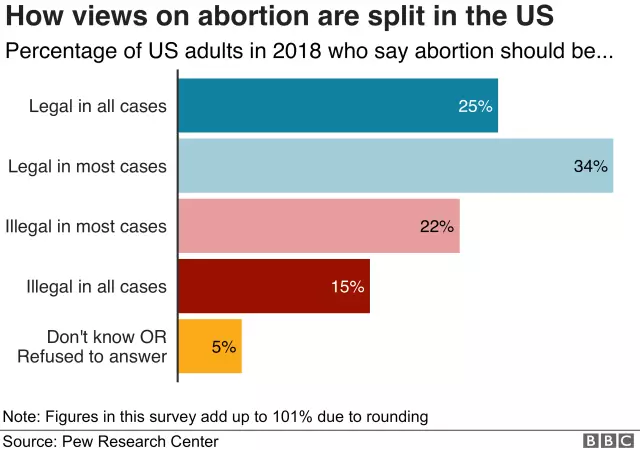- Author Rachel Wainwright wainwright@abchealthonline.com.
- Public 2023-12-15 07:39.
- Last modified 2025-11-02 20:14.
Abortion at 6 weeks
For many reasons, it may turn out that the onset of a woman's pregnancy is not desirable.

In most cases, this occurs at a young age when young girls do not adhere to adequate contraceptive methods. Unfortunately, the lack of the necessary knowledge, as well as the lack of a culture of sexual relations, led to the fact that in many situations, from 4 to 6 weeks, abortion is often used as contraception.
How many weeks can an abortion be done?
Finding herself in a difficult situation, a woman, first of all, seeks to find out when it is best to have an abortion in order to avoid negative consequences for her body.
The timing of pregnancy and the general condition of the woman are the determining factor in choosing the type of abortion. However, this issue must be resolved exclusively with a doctor who can offer her the safest option.
The most preferred type of abortion at 6 weeks gestation is medical abortion. It is believed that its consequences are minimal, and possible complications can be easily treated (usually with antibiotics).
Features of medical abortion at 6 weeks
Medical abortion at the 6th week of pregnancy is the most optimal and safest method, since it does not affect reproductive function, which will allow you to bear and give birth to a healthy baby in the future.
Another factor that is usually important, especially for young women, is psychological. A medical abortion is much easier to carry than a vacuum or surgical abortion. In this case, it is not necessary to be in a hospital, but it is enough to undergo the usual examination necessary for an abortion, including ultrasound and tests.
While medical abortion at 6 weeks seems like a straightforward procedure, it requires a serious approach.
In order for the procedure to be successful, it is necessary to calculate the correct dose of the medication, which can only be done by an experienced gynecologist.
After the procedure, the woman must undergo an additional examination in a day to exclude incomplete or ongoing pregnancy. If the procedure was successful, further treatment based on the tests received should also be prescribed by the doctor.
Medicines used for abortion at 6 weeks of gestation
There are a number of medicines that make it the easiest way to have an abortion at 6 weeks:
- Mytholian is one of the safest means for abortion, which is often used to accelerate natural childbirth. In the process of its use, the ovum detaches from the uterus;
- Mifepristone with the active ingredient of the same name is also used for detachment of the ovum in early pregnancy (up to 6 weeks). As a rule, three tablets are prescribed at the same time;
- Mifeprex is prescribed quite often as the most effective and safe medication, which usually does not cause complications and side effects. As a rule, a few days after taking the tablets, spotting is possible;
- Mifegin is considered the most reliable medication for an abortion at 6 weeks. Its appointment guarantees an almost one hundred percent result with minimal risk of complications.
Advantages and Disadvantages of Medical Abortion at Week 6
The uterine cavity after a medical abortion remains intact, and it is very important for a future pregnancy that it is not injured. Compared to other types of abortion, medical abortion has a number of advantages:
- No need to undergo the procedure in a hospital;
- Abortion does not cause the development of secondary infertility;
- The process of abortion is similar to menstruation, as it occurs by rejection of the ovum;
- It rarely causes complications during and after the procedure;
- The risk of abscesses, inflammation and infection with various infections is practically zero;
- There is no need for surgery or anesthesia. Thus, there are no negative consequences associated with this.
However, with all the benefits, there are a number of drawbacks to medical abortion at week 6. First of all, unlike the surgical method, taking medication to terminate a pregnancy does not give a 100% guarantee.
In addition, the possible side effects of these medications can be serious. These include blood clotting disorders and the development of bleeding. Also, if there are prerequisites, they significantly increase the risk of tumors, various hormonal disorders and inflammatory processes in the genitals.
Self-termination of pregnancy, even in the early stages, is highly discouraged, since only an experienced doctor will be able to assess all existing risks and give the necessary recommendations for the safest abortion for a woman's health at 6 weeks.
Complications after termination of pregnancy up to 6 weeks
An early abortion (up to 6 weeks) is considered the safest. At this time, the egg is poorly attached to the uterus, and the fetus is not yet formed. It is this period that is characterized by the most frequent spontaneous miscarriages.
For medical abortion for a period of up to 6 weeks, complications are most often characteristic that are associated with intolerance to one or another component included in the remedy.
It should be noted that an abortion carried out up to 6 weeks with the help of medication has side effects, which, as a rule, are individual in nature.
Termination of pregnancy by other means
Other methods are distinguished depending on how many weeks the abortion occurs.
Vacuum aspiration is a fairly safe procedure, but, as a rule, it can cause a number of unwanted complications.

However, this method is still more preferable than surgical intervention. In this case, complications of the genitourinary system can be quite serious and in some cases irreversible.
Vacuum aspiration in early pregnancy is performed:
- For medical reasons;
- In case of miscarriage (fetal death);
- After a failed medical abortion;
- With incomplete miscarriage (after incomplete spontaneous abortion).
In some cases, after vacuum aspiration, an undiagnosed ectopic pregnancy may occur, in which the development of the fetus does not occur in the uterus itself. In this case, this method of abortion at 6 weeks is ineffective. An ectopic pregnancy may be indicated by the following symptoms that occur after the abortion procedure:
- Increasing pelvic or abdominal pain;
- Pain during intercourse;
- Vaginal bleeding
- Fainting and dizziness due to blood loss.
When the described symptoms appear, you should consult a doctor for advice and conduct the studies necessary for further diagnosis.
YouTube video related to the article:
Found a mistake in the text? Select it and press Ctrl + Enter.






